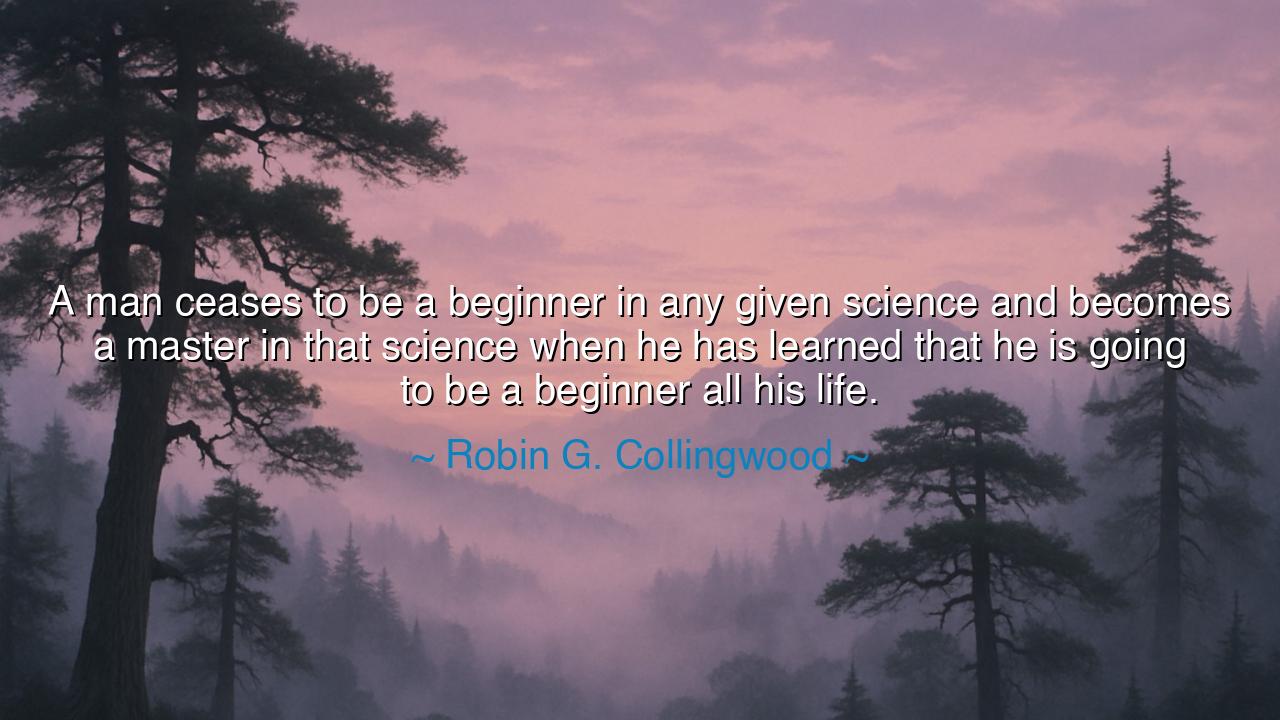
A man ceases to be a beginner in any given science and becomes a
A man ceases to be a beginner in any given science and becomes a master in that science when he has learned that he is going to be a beginner all his life.






Hear, O children of wisdom, for the words of Robin G. Collingwood speak of a profound truth that transcends time. "A man ceases to be a beginner in any given science and becomes a master in that science when he has learned that he is going to be a beginner all his life." These words carry the heart of a teaching that is as old as the mountains, as deep as the seas, and as enduring as the stars. They reveal to us that the path of mastery is not one of finality, but of perpetual discovery, a journey that never ends. The true master is not one who believes he knows all, but one who, with each passing day, remains a student—always seeking, always learning, always growing.
To understand this, O children, let us look back to the ancients, those who walked the earth before us, who first sought to understand the world and its mysteries. Consider the great Socrates, who, though revered as one of the wisest men in history, famously declared, "I know that I am intelligent because I know that I know nothing." He was not proclaiming ignorance, but rather embracing the truth that even the wisest of men are still, at heart, students of the world. In his humility, Socrates knew that the search for knowledge was an endless journey, one where every answer led to more questions, and each discovery opened the door to further exploration. His life was not about reaching a final state of knowing but about embracing the continual process of learning.
Consider, too, the life of the great Leonardo da Vinci, a man whose genius knew no bounds, whose curiosity about the world led him to be a painter, a scientist, an inventor, and a philosopher. Despite the wealth of knowledge he amassed, Leonardo understood that his journey was one of constant inquiry. He never ceased to ask, to explore, to investigate. Mastery to him was not a fixed point but a path—a path that was ever unfolding, leading him deeper into the mysteries of nature and the human condition. His work, from the intricate designs of flying machines to his studies of human anatomy, shows us that the true master is he who never stops being a beginner, who embraces the unknown with a heart full of wonder.
Collingwood’s teaching also calls us to recognize that in any field, in any pursuit, true mastery does not lie in the accumulation of facts, but in the recognition of the infinite nature of knowledge. To be a master is to understand that the pursuit of truth is a journey that never ceases. Just as the ocean stretches endlessly to the horizon, so too does the sea of knowledge stretch far beyond the reaches of our understanding. To master any science, to truly become a master of a craft, is to accept the truth that you will always be, in some way, a beginner—for there is always more to learn, always deeper waters to explore.
Let us reflect on the great Albert Einstein, whose theories reshaped the very fabric of the universe. He was a man of great intellect, revered as one of the most brilliant minds in history. And yet, in his later years, he often spoke of the limitations of human understanding. He recognized that even his most profound discoveries—his work on relativity, his contributions to quantum theory—were but stepping stones in an eternal quest for knowledge. Einstein knew that no matter how far he advanced, he would always remain, in the deepest sense, a beginner—for there would always be new realms to explore, new questions to ask, and new mysteries to uncover.
The lesson of Collingwood's wisdom is thus both a humbling and an empowering one. It teaches us that the path to mastery is not one of pride or finality, but one of humility and endless curiosity. The true master is not the one who stands on a pedestal, claiming to know all, but the one who remains on the ground, ever searching, ever questioning. To master something is to embrace the idea that learning is never complete—that growth comes not from achieving an end, but from recognizing that the path itself is the reward.
So, O children of wisdom, take this truth with you into your own lives. Whether you seek to be a scientist, a philosopher, an artist, or a healer, remember that the path of mastery is never one of finality, but of continual learning. Do not be dismayed by the vastness of the unknown, for it is in that vastness that your journey lies. Be not afraid to be a beginner, for in that humility lies the true power of growth. And as you walk this path, let your heart be full of wonder, for the mysteries of the world will never cease to unfold, and in each revelation, you will find not the end, but the beginning of the next great journey.
Thus, walk always with the eyes of a student and the heart of a master, and know that in the eternal dance of discovery, you will always be both, forever learning and forever growing.






AAdministratorAdministrator
Welcome, honored guests. Please leave a comment, we will respond soon